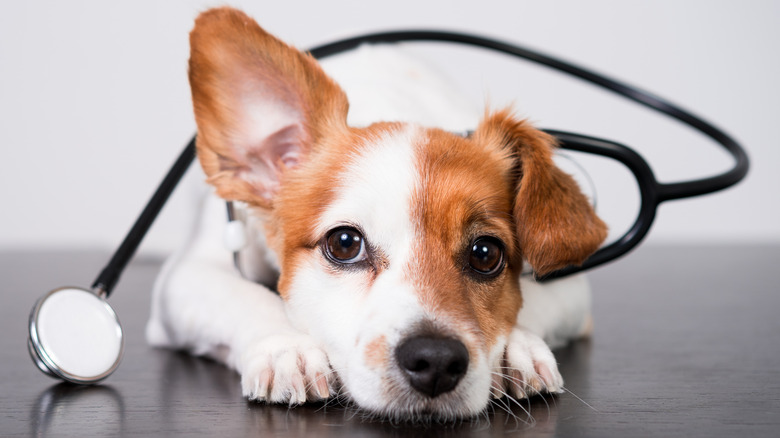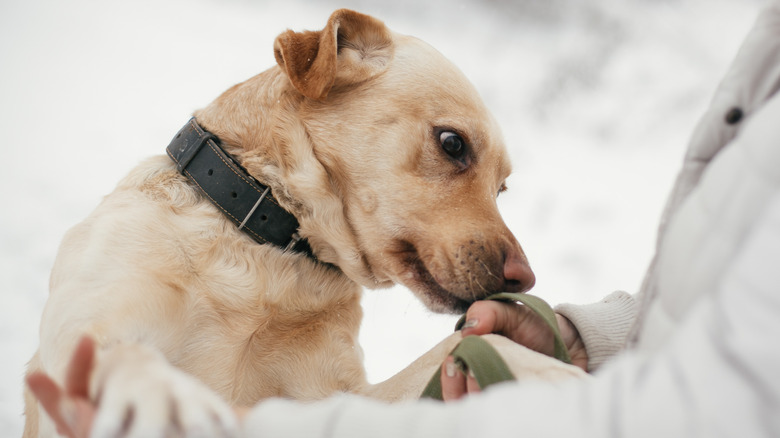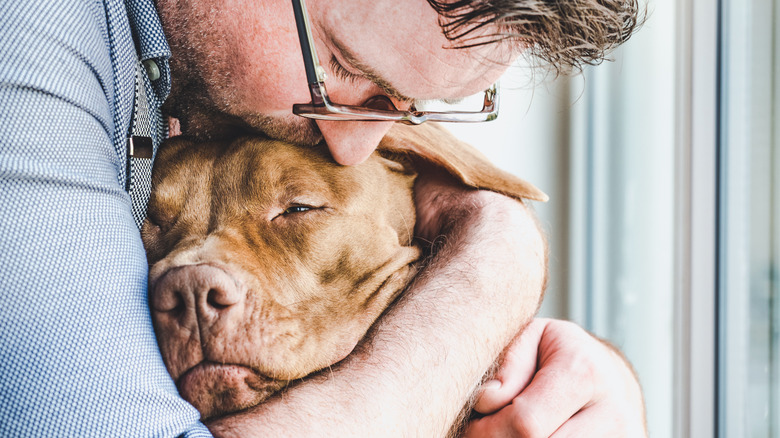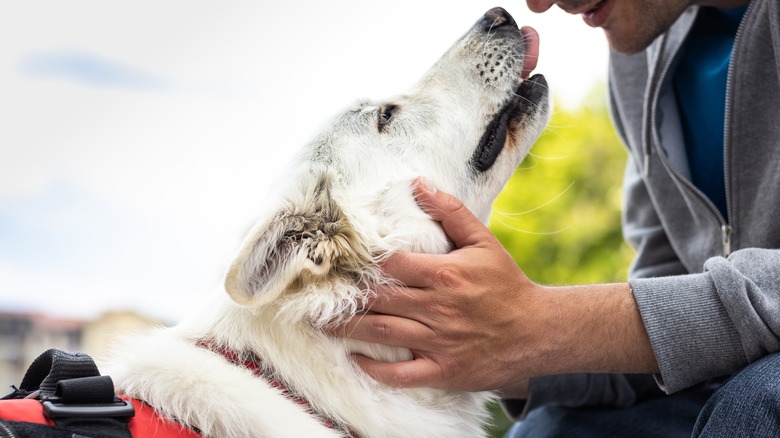Medical Conditions That Your Pets Can Sense
Dogs have played the rule of nurses and therapists for centuries. You know the feeling — you're down with a cold or a headache and there's Fido, ready to help you through your sick days. But it turns out dogs can do more than just help you nurse a cold: they can also detect serious medical issues that can endanger your life. Some can do it earlier than doctors or tests — and no, this isn't one of those false facts about dogs you always thought were true.
Researchers believe animals are extremely sensitive to their owners' emotions and physical issues and are able to tell when something is wrong. While some of it is because of their intense connection to their humans, much of it is simple "nose magic." Illnesses, as well as certain medical conditions, change the way a person (or another animal) smells (via The Atlantic).
A study published in Animal Cognition shows that animals can get a lot of information from chemosignals (body odor) produced by their owners. In fact, researchers involved with the study could identify changes in dogs' stress level and heart rate depending on whether the animals could smell fear or happiness coming from a person. So it's not just physical smells that could let a dog know you might be sick, but also your emotions producing a certain smell they find either attractive or worrying.
It's all about the nose
Nose power, however, is the key to understanding how dogs can tell if somebody is sick. Researchers believe dogs have a nose anywhere from 10,000 to 100,000 more powerful than ours. For example, a dog can evidently detect the smell of a teaspoon of sugar in a million gallons of water while we're only able to smell that amount of sugar in our morning cup of coffee (via "NOVA" on PBS).
It's a difficult-to-imagine power that helps dogs find rescue survivors after a disaster, or find minuscule amounts of drugs in an airport. It's also why more and more dogs are being taught how to sniff out cancer. The area of the brain that analyzes and breaks down odors in dogs is also bigger and more active than ours. So they're not only better at sniffing, but also at processing those signals, according to "NOVA."
While dogs seem more apt to recognize certain diseases over others, scientists keep finding dogs' disease-sniffing abilities are always expanding. In 2018, The Guardian reported that researchers from Durham University confirmed dogs can sniff out malaria even before people are showing symptoms. This is because malaria produces a very specific chemical smell that can be detected through the breath and skin — that is, if you're a dog with a super-nose. This could be a huge tool to help countries where malaria is still a major health risk.
Dogs detecting cancer
Of all the instances of animals detecting illnesses or medical conditions, a large number are cancer-related. In 2019, a study published in Oncoscience looked into "canine cancer detection" and how and why dogs seem to be able to tell that their owners have cancer. The consensus among researchers is that dogs can smell the presence of compounds released by tumors, even in very small quantities. The smell of tumor necrosis (tissue dying) comes through a person's breath, urine, or feces and some animals are very sensitive to it.
Research teams around the world are putting these capabilities to the test. For example, there's been extensive research on dogs detecting melanoma accurately, but dogs have also recognized basal cell carcinoma and breast cancer, according to Roswell Park Comprehensive Cancer Center. In 2015, Italian researchers even confirmed that dogs were being trained to detect prostrate cancer through urine samples (via MK Citizen).
The University of Pennsylvania Veterinary School's Working Dog Center has been actively involved in studying how dogs can detect cancer, and have found different levels of success with dogs detecting cervical, ovarian, bladder, and lung cancer through biopsy, blood, and urine samples, as well as breath, according to Roswell Park Comprehensive Cancer Center.
Diabetes service dogs
Diabetes service dogs are more common than you think, and with good reason. In 2019, PLoS One published a paper titled "How effective are trained dogs at alerting their owners to changes in blood glycaemic levels?: Variations in performance of glycaemia alert dogs." The results show dogs are better than expected, predicting an episode correctly an average 70% of the time — with some dogs actually predicting 100% of the episodes correctly. Accuracy was better for hypoglycemic episodes (83%) than for hyperglycemic episodes (67%). For people with type 1 diabetes, living with a dog that can accurately predict when glucose levels are going out of control can be lifesaving.
The ability of dogs to detect hypoglycemia before the owners have any obvious symptoms is particularly important, especially if the person is not regularly wearing a continuous glucose monitor, according to WebMD.
As in the case of cancer, dogs can smell blood sugar changes. Researchers have even figured out what the dogs are smelling — and it's isoprene, a chemical humans exhale when they breathe. And while that wouldn't be ordinarily noticeable, doctors can detect higher levels of isoprene in your breath when blood sugar levels drop (via Science Alert).
Parkinson's disease and epileptic seizures
Things are a little less clear for other medical issues. For example, dogs have been shown to be extremely accurate when detecting epileptic seizures (some dogs can reach a score of 100% accuracy), though scientists don't quite understand what exactly are the dogs sensing. One of the theories is that the electric charge in the body changes and some dogs might be sensitive to that. Other theories are that people about to experience a seizure produce a specific smell in their sweat, urine, or breath. Either way, some dogs are able to predict a seizure up to 45 minutes before it happens (via Business Insider).
Researchers have also found that dogs are able to detect Parkinson's disease because the illness has a very particular smell — one that even humans with very sensitive noses can sometimes detect as well, according to the American Parkinson Disease Association. The smell is potentially so strong and distinctive to dogs that they are able to recognize it by just smelling clothes worn by the patients. In the case of Parkinson's, the smell seems to be coming from areas in the body with a high number of sebaceous glands, like the back of the neck or the scalp in people suffering from seborrheic dermatitis.
It's not just dogs, either
While dogs get most of the credit as medical detection animals, researchers have also started looking into the abilities of cats to do the same. Cats' sense of smell is actually better than dogs — dogs' noses have nine variants of V1R receptor proteins, which controls the ability to distinguish smells. Humans have two and cats have 30 (via News.com.au).
A cat in the U.K. was able to detect her owner's breast cancer long before there was any suspicion that something was wrong, via a 2012 HuffPost News article. Other anecdotal reports also credit cats with detecting other types of cancer, including lung cancer (per Healthy Paws Insurance).
The problem with cats is that they aren't as trainable as dogs (or so the myth goes), so researchers haven't focused on formal studies, explains Healthy Paws Insurance. The potential of dogs helping detect medical issues early depends a lot on the dog's interest in being trained and rewarded for it, which cats might not be as interested in doing. But this might change as scientists decide it's time to tap into cats' incredible nose power.





